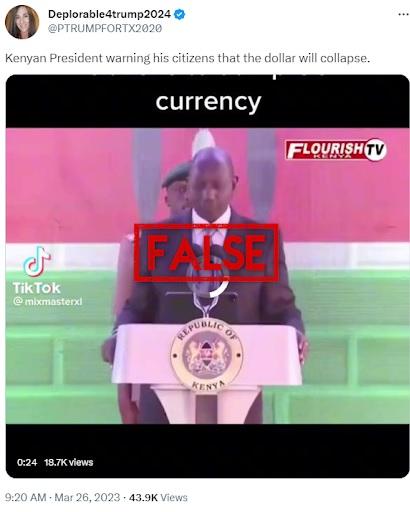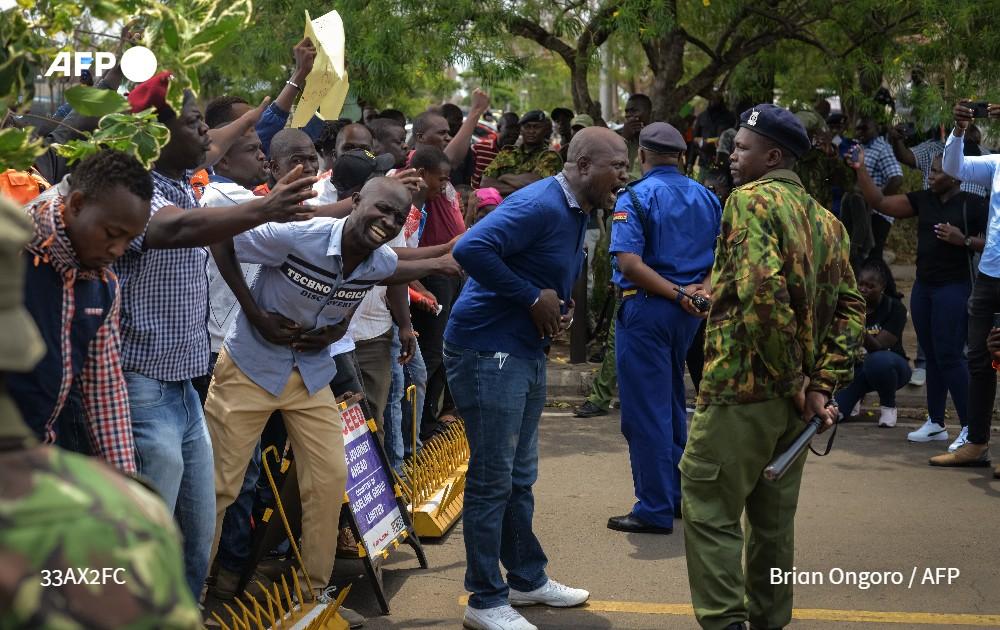
Posts manipulate Kenyan president’s remarks about US dollar following fuel deal
- This article is more than two years old.
- Published on April 5, 2023 at 14:20
- 3 min read
- By Erin FLANAGAN
“Kenyan president warning his citizens that the dollar will collapse,” reads a tweet posted on March 26, 2023.

The tweet features a video of Ruto speaking to an audience.
In the clip, he says: “I am giving you free advice that those of you who are holding dollars, you certainly might go into losses. You better do what you must do because this market is going to be different in a couple of weeks.”
The same claim was shared by other users on Twitter and Facebook.
On March 20, 2023, chaotic anti-government protests erupted over a surging cost-of-living crisis and opposition leader Raila Odinga’s claims that the August 2022 elections were stolen.
The opposition leader narrowly lost his fifth run for the presidency in the August poll despite being backed by former president Uhuru Kenyatta.

The Kenyan shilling has sunk to historic lows (archive here), losing nearly four percent of its value against the US dollar in March, according to the think tank Oxford Economics Africa.
Though Kenya’s central bank has around $6.8 billion in reserves, the exchange rate between the Kenyan shilling and USD “can cause rationing and speculative hoarding”, economic analyst Reginald Kadzutu of Nairobi-based Amana Capital Limited told AFP Fact Check.
Those with dollars might hold them in the hopes of selling at a higher price in the future, which decreases access to the US currency.
The demand for dollars in Kenya is driven “mainly by importers” because they use it to buy goods like fuel, Kadzutu added.
This imbalance between imports and exports “puts pressure on the dollars available in the market”.
Many Kenyans are struggling to put food on the table, battling high prices for basic goods and a record drought that has left millions hungry.
The United Nations says 12 million people in Ethiopia, 5.6 million in Somalia and 4.3 million in Kenya are "acutely food insecure".
The overall figure has almost doubled from 13 million at the start of 2022, the UN's World Food Programme said in a January 23 report.
But the claim that the video shows Ruto warning Kenyans that the US dollar will collapse is misleading.
Kenya’s new import deal
Using a keyword search for “Ruto speech US dollar,” AFP Fact Check found the original footage posted online (archive here) by NTV Kenya on March 22, 2023.
The video shows a longer clip of Ruto giving the speech shared in the social media posts.
After his opening gibe about dollar holders facing losses, he describes the recent import deal Kenya made with the United Arab Emirates and Saudi Arabia to buy fuel on credit. This deal came after the existing shortage of foreign currency led to stations running out of petrol.
“I just want to ensure those in Kenya who are facing challenges of access to dollars … that dollar availability in the next couple of weeks is going to be very different because our fuel companies will now be paying for fuel in Kenya shillings, they do not have to look for dollars every month,” Ruto says in the longer version of the video.
His comment that those holding US dollars will suffer losses did not refer to a global collapse of the currency but rather an anticipated local decrease in demand as a result of the fuel deal.
Global reserve currency
The decision to import fuel in shillings is meant to decrease demand for US dollars in the fuel importation market.
In doing so, the Kenyan government hopes to make it easier for other sectors to access foreign currency and narrow the exchange rate.
As the premier global reserve currency, the US dollar is considered a “safe haven” (archive here), meaning it is backed by a stable economy.
Central banks around the world generally keep a reserve of dollars to facilitate international commerce and global finance.
According to the International Monetary Fund (archive here), the dollar is still the dominant global foreign-exchange reserve in the world, used more than all other currencies combined.
Copyright © AFP 2017-2026. Any commercial use of this content requires a subscription. Click here to find out more.
Is there content that you would like AFP to fact-check? Get in touch.
Contact us
